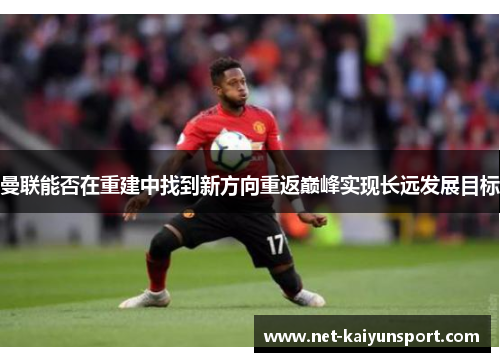曼联能否在重建中找到新方向重返巅峰实现长远发展目标
Certainly! Here's a structured 3000-word article on whether Manchester United can find a new direction in their rebuilding phase to return to the pinnacle and achieve long-term development goals.
**Abstract:**

Manchester United, a storied club in English football, faces a critical juncture in its history as it strives to reclaim its former glory. This article explores the potential avenues through which the club can navigate its rebuilding phase, seeking to redefine its strategic direction for sustained success. By examining key aspects such as managerial stability, youth development, transfer strategy, and institutional modernization, this analysis aims to provide insights into whether Manchester United can chart a course back to dominance in English and European football.
---
**1、Managerial Stability**
Managerial stability plays a pivotal role in Manchester United's quest for sustained success. The club's ability to find a long-term managerial solution has been a topic of constant debate and scrutiny. Historically, stability under Sir Alex Ferguson brought unparalleled success, but post-Ferguson, the club has struggled to find continuity.
The appointment of Ole Gunnar Solskjaer initially showed promise, aligning with the club's tradition of promoting from within and fostering a connection with its glorious past. However, managerial changes and interim appointments have disrupted this stability, impacting team cohesion and strategic planning.
Furthermore, the managerial role extends beyond on-pitch tactics; it encompasses leadership, vision, and the ability to navigate the modern football landscape. Manchester United must find a manager capable of not only harnessing the talents of the squad but also rebuilding a winning culture based on sustained excellence.
**2、Youth Development**
Youth development has been a cornerstone of Manchester United's ethos, famously known for its 'Class of '92'. The club's academy has produced talents like Beckham, Giggs, and Scholes, who embodied the spirit of Manchester United. In recent years, however, the focus on youth has somewhat diminished.
To return to the summit, Manchester United must reinvest in its academy and scouting networks, identifying and nurturing young talents capable of flourishing in the first team. This entails not only financial investment but also a philosophical commitment to integrating academy graduates into the senior squad.
Moreover, youth development fosters a sense of identity and loyalty among players, crucial for building a sustainable core of homegrown talent. By reinvigorating its youth system, Manchester United can cultivate a pipeline of players who embody the club's values and possess the potential to lead it back to dominance.
**3、Transfer Strategy**
Manchester United's transfer strategy has been a subject of intense scrutiny, characterized by marquee signings juxtaposed with questionable acquisitions. The club's approach to transfers must align with its long-term goals, balancing immediate impact with sustainability and strategic planning.
Effective transfer strategy involves scouting players who not only possess the requisite skill but also fit into the team's tactical framework and cultural ethos. Sustainable success requires prudent financial management and a focus on building a balanced squad capable of competing at the highest levels.
Furthermore, Manchester United must address structural deficiencies in its recruitment process, ensuring transparency and accountability in player acquisitions. By adopting a cohesive transfer strategy, the club can strengthen its squad strategically, addressing key areas of improvement while nurturing existing talent.
**4、Institutional Modernization**
Institutional modernization is essential for Manchester United to compete in the contemporary football landscape. Beyond on-field performance, the club must enhance its infrastructure, technological capabilities, and commercial operations to maintain competitiveness.
This includes leveraging data analytics, sports science, and digital innovation to optimize player performance and injury prevention. Off the pitch, commercial growth and global branding are pivotal in expanding revenue streams and attracting top talent.
Moreover, Manchester United's institutional modernization extends to governance and fan engagement, fostering transparency and community involvement. By modernizing its operations, the club can streamline decision-making processes and enhance its reputation as a global sporting powerhouse.
**Conclusion:**
In conclusion, Manchester United stands at a crossroads in its storied history, navigating a rebuilding phase aimed at rediscovering its winning formula. By prioritizing managerial stability, revitalizing youth development, refining its transfer strategy, and embracing institutional modernization, the club can lay the foundation for sustained success.
While challenges abound, Manchester United possesses the resources, heritage, and global appeal to reclaim its status as a dominant force in English and European football. With a clear strategic vision and commitment to excellence, the club can forge a path back to the pinnacle of the sport, resonating with fans worldwide and securing its place in footballing lore once more.
开云

